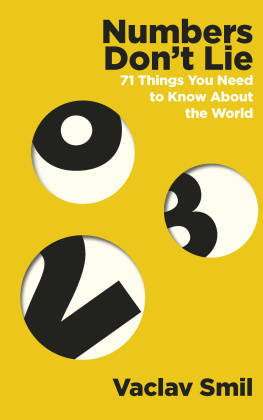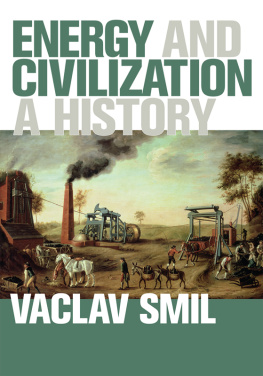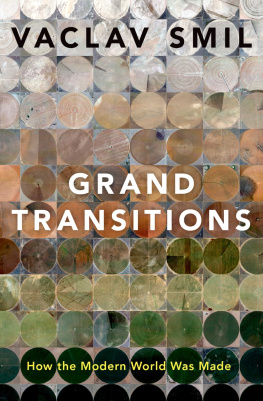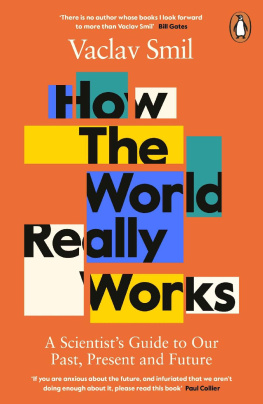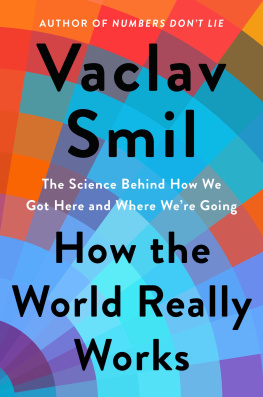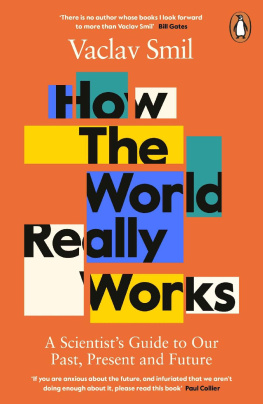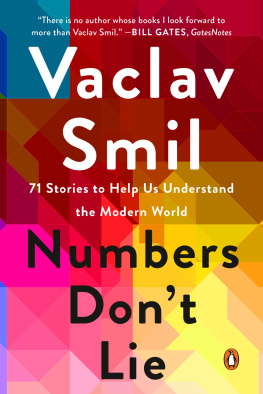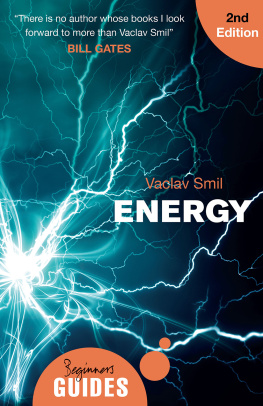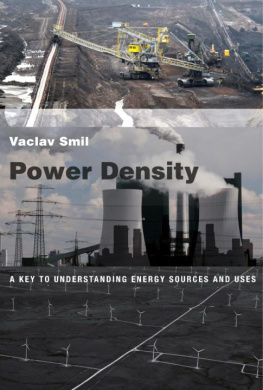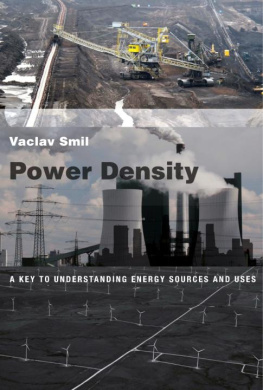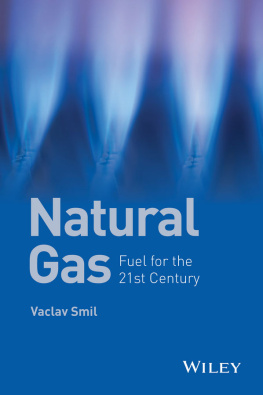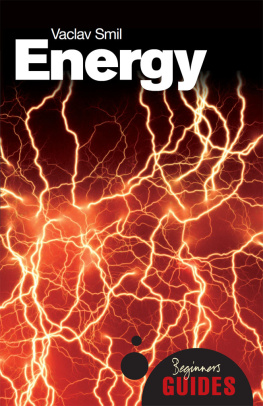
Vaclav Smil
NUMBERS DONT LIE
71 Things You Need to Know About the World

Contents
- PEOPLE :
The Inhabitants of Our World - COUNTRIES :
Nations in the Age of Globalization - MACHINES, DESIGNS, DEVICES :
Inventions That Made Our Modern World - FUELS AND ELECTRICITY :
Energizing Our Societies - TRANSPORT :
How We Get Around - FOOD :
Energizing Ourselves - ENVIRONMENT :
Damaging and Protecting Our World
About the Author
Vaclav Smil is Distinguished Professor Emeritus at the University of Manitoba. He is the author of over forty books on topics including energy, environmental and population change, food production and nutrition, technical innovation, risk assessment and public policy. He is a Fellow of the Royal Society of Canada and a Member of the Order of Canada.
Introduction
Numbers Dont Lie is an eclectic book, with topics ranging from people, populations, and countries, through to energy use, technical innovation, and the machines and devices that define our modern civilization. For good measure, it closes with some factual perspectives on our food supply and eating choices, and on the state and degradation of our environment. These are the big topics I have pursued in my books since the 1970s.
First and foremost, this book is about getting the facts straight. But that is not as easy as it might seem: while the World Wide Web teems with numbers, too many of them are undated hand-me-downs of unknown provenence, often with questionable unit identifiers. For example, French GDP in 2010 was US $2.6 trillion: was that value in current or constant monies, and was the conversion from euros to dollars done using the prevailing exchange rate or purchasing power parity? And how would you know?
In contrast, nearly all the numbers in this book are taken from four kinds of primary sources: worldwide statistics published by global organizations, A small share of the numbers come from scientific monographs, from recent studies done by major consulting agencies (known for the reliability of their reports), or from public opinion polls conducted by such long-established organizations as Gallup or the Pew Research Center.
To understand what is really going on in our world, next we must set the numbers in the appropriate contexts: historical and international. For example, starting with the historical context, the scientific unit of energy is one joule, and affluent economies now consume annually about 150 billion joules (150 gigajoules) of primary energy per capita (for comparison, one ton of crude oil is 42 gigajoules); while Nigeria, Africas most populous (and oil- and natural gasrich) nation, averages only 35 gigajoules. The difference is impressive, with France or Japan using nearly five times as much energy per capita, but the historical comparison illuminates the real size of the gap: Japan used that much energy by 1958 (an African lifetime ago), and France averaged 35 gigajoules already by 1880, putting Nigerias access to energy two lifetimes behind France.
Contemporary international contrasts are no less memorable. Comparing the American infant mortality rate with that of sub-Saharan Africa reveals a large but expected gap. And that the United States does not belong to the top 10 countries with the lowest infant mortality is not that surprising considering its highly diverse population and high rates of immigration from less developed countriesbut few people would guess that it does not rank even among the top 30 nations! This surprise leads, inevitably, to asking why this is the case, and that question opens a universe of social and economic considerations. True comprehension of many numbers (individually or part of complex statistics) requires a combination of basic scientific literacy and numeracy.
Length (distance) is the easiest measure to internalize. Most people have a fair grasp of 10 centimeters (the width of an adult fist with a thumb held outside), a meter (roughly ground-to-waist for an average man), and a kilometer (a one-minute drive in city traffic). Common speeds (distance/time) are also easy: a brisk walk is 6 km/h, a rapid intercity train is 300 km/h, a jetliner pushed by a strong jet stream does 1,000 km/h. Masses are more difficult to feel: a newborn child usually weighs less than 5 kilograms, a small deer less than 50 kilograms, some battle tanks weigh less than 50 tons, and the maximum takeoff weight of an Airbus 380 is more than 500 tons. Volumes can be equally tricky: the gasoline tank of a small sedan is less than 40 liters; the internal volume of a small American house is usually less than 400 cubic meters. Getting the feel for energy and power (joules and watts) or current and resistance (amperes and ohms) is hard without working with these units frequentlyso relative comparisons, such as the gap between African and European energy use, are easier.
Money presents different challenges. Most people appreciate relative levels of their incomes or savings, but historic comparisons on a national and international level must be adjusted for inflation, and international comparisons must account for fluctuating exchange rates and changing purchasing powers.
And then there are qualitative differences that cannot be captured by numbers, and such considerations are particularly important when comparing food preferences and diets. For example, carbohydrate and protein content per 100 grams may be very similar, but what passes for bread in an Atlanta supermarket (pre-sliced soft square shapes packed in plastic sleeves) isquite literallyan ocean apart from what a matre boulanger or a Bckermeister would display in their shops in Lyon or Stuttgart.
As numbers get bigger, orders of magnitude (tenfold differences) become more telling than the specific figures: an Airbus 380 is an order of magnitude heavier than a battle tank; a jetliner is an order of magnitude faster than a car on a freeway; and a deer weighs an order of magnitude more than a baby. Or, using superscripts and multiples according to the International System of Units, a newborn baby is 5 x 103 grams or 5 kilograms; an Airbus 380 is more than 5 x 108 grams or 500 million grams. As we get into really big numbers, it does not help that Europeans (taking the French lead) deviate from scientific notation and do not call 109 a billion but (vive la difference!) un milliard (resulting in une confusion frquente). The world will soon have 8 billion people (8 x 109), in 2019 its economic output (in nominal terms) was about $90 trillion ($9 x 1013), and it consumed more than 500 billion billions of joules of energy (500 x 1018, or 5 x 1020).
The good news is that mastering much of this is easier than most people think. Suppose you put down your mobile phone (I have never owned one, nor felt like I was missing out) for a few minutes a day, and estimated the lengths and distances around youchecking them, perhaps with your fist (remember, about 10 centimeters) or (after picking your mobile back up) through GPS. You should also try to calculate the volumes of objects you encounter (people always underestimate the volume of thin but large objects), and it is an outright entertaining proposition to calculate (without any electronic help) the differences in orders of magnitude as you read about the latest national income inequalities between billionaires and Amazon warehouse packers (how many orders of magnitude separate their annual take?), or as you see a comparison of average national per capita GDP rates (how many orders of magnitude is the United Kingdom above Uganda?). These mental exercises will put you in touch with the physical realities of the surrounding world while keeping your synapses firing. Understanding numbers simply takes a bit of engagement.
Next page
